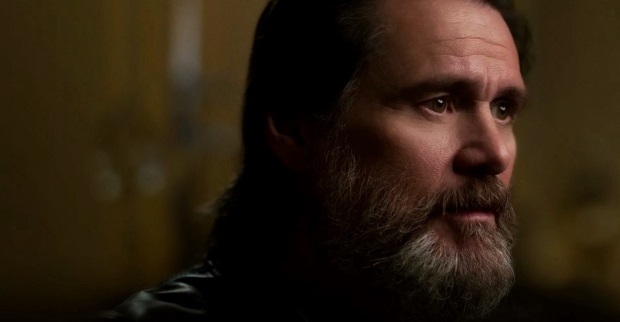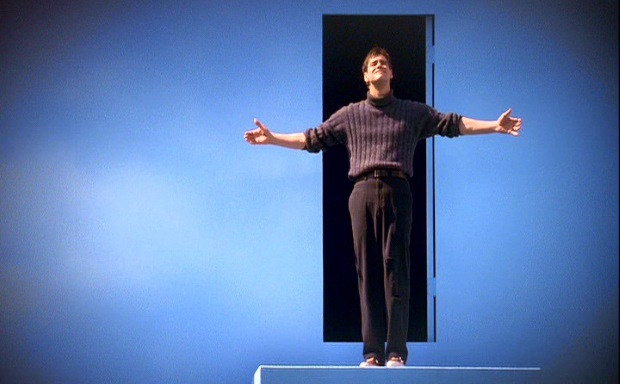Jim Carrey and Changing Your Avatar
20 years on from The Truman Show, a role that shaped Jim Carrey's career, a look at how he turned about his persona...
This article comes from Den of Geek UK.
Jim Carrey is a changed man. That is, the avatar that is presented to us as Jim Carrey has changed.
When the comedian waltzed out in front of E! News during New York Fashion Week and declared that everything was meaningless and that none of us are really here, the subtext of the resulting headlines was that Carrey had experienced a nervous breakdown, was battling depression or was just plain bat-shit crazy. “I don’t believe that you exist… but there’s a wonderful fragrance in the air,” said Carrey to the presumably sweet-smelling Catt Sadler.
But whereas most amateur psychologists would jump to define Carrey’s drastically altered persona as one that’s experiencing an existential crisis, Jim Carrey himself instead refers to it as an existential discovery.
This is a discovery which came about whilst filming Milos Forman’s Man On The Moon, the Andy Kaufmann biopic that famously saw Carrey “lose himself” in the avant-garde comedian’s persona whilst going full-on method. During filming, he refused to acknowledge that he was actually Jim Carrey, spent time in character with those nearest and dearest to Andy and openly admits that Kaufmann took full control of him. It was in the Netflix documentary Jim And Andy: The Great Beyond that Carrey’s existential discovery was brought to light. And an enlightening watch it is.
Carrey justifies his discovery because he could so easily ‘become’ Kaufmann and lose himself in the process. He discovered that none of this matters: your individuality, your struggle, your ego. They’re all abstract concepts which are keeping you boxed within this avatar that you have created for yourself: a ridged representation of the way you want to be perceived by others. Kaufmann seemingly had no sense of this, often blurring the lines of where his own performance began and ended.

This occupying of ‘The Great Beyond’, like Jim and like Andy, sets up the concepts of individuality, ego and being complete as figurative finish lines which you will never reach, and will keep you feeling unfulfilled and unsated as long as you continue to strive for them. The answer according to Carrey? Stop striving and just be.
I know. Firstly, this is coming from Jim Carrey, the actor and comedian who once made a $10 million cheque out to himself to inspire him to reach the heady heights of Hollywood. This is the man who, as a character, gurned, recited catchphrases and performed pratfalls to earn that money in such films as The Mask, Dumb And Dumber and Ace Ventura: Pet Detective. The dubious part for most is that now that he’s wealthy, he’s all of a sudden ‘world-weary’ and realises that Jim Carrey himself is a character. Hashtag first world problems and all that.
But Jim Carrey actually reached his figurative finish line and guess what? Nothing changed for him. He was still unhappy. Does that make him more qualified to comment on fulfilment? Voicing this revelation, Carrey posits that “I think everybody should get rich and famous and do everything they ever dreamed of so they can see that it’s not the answer.”
And it’s seemingly because the entity earning that $10 million was the Jim Carrey avatar: the character that manifests the qualities he wants to display to the real world. Forget Stanley Ipkiss from The Mask, Jim Carrey’s character is the guy who pulls faces on the red carpet, that says “Alrighty, then” in interviews and the one who’s always funny (until now). And Jim Carrey is a character that he’s tired of trying to portray.

Back to the amateur psychologist and this is where the link to depression kicks in. Speaking to the Hollywood Reporter, Carrey said; “Depression only happens when you don’t accept what is, and you’re playing a character in life. So when I got back to playing Jim Carrey, I got depressed.”
This aspect of Carrey’s philosophy that seemingly knows no bounds of class, gender or race and is all the more poignant for it. In short, he’s talking about everyone who plays a character, day in and day out. You, me, him and her. Like Pharell, we’re all frontin’.
Re-emphasised during the Jim And Andy documentary, Carrey relates this idea to anybody who has to go in to work and dress a certain way and say a certain thing to convince everyone around them that they’re a winner. Referring to this inappropriate sense of self, Carrey continues; “I found the hole in the psyche and I’m going through, and I’m going to face the abyss of not knowing whether that’s gonna be okay with everybody or not.” In other words, stop playing your character.
Going through the hole in the psyche and into ‘The Great Beyond’ has clear links to Jim Carrey’s first big ‘serious’ role in Peter Weir’s The Truman Show. Carrey considers the film to be prophetic and the absolute manifestation of his consciousness at that time. On the surface, the film tackles the trappings of fame and all-too-awkwardly forecasts our obsession with reality TV and smart-phone surveillance.
But in applying Carrey’s philosophy to The Truman Show, the dome in which Truman lives is our reality where we and our avatars reside. The door to the outside of the dome and the ‘real world’ or the truth, is the way to ultimate enlightenment. We ourselves, behind our avatars can stay in the dome, effectively playing as actors on a predetermined path just like Meryl Burbank and best mate Marlon, or we can step out into what’s beyond the dome as Truman does.
But the big question is: what is beyond? The most consistent idea that Carrey puts forward is the feeling of being ‘free from concern’, that is, being in that state where we aren’t worried about how we’re perceived by others, the MOT that needs organising or about the bills that we need to pay. Some people manage to attain being free from concern through short-lived lowered inhibitions often associated with drink, drugs or some-such escape. And that feels good. For a while.

But this idea of being free of concern is how Carrey made his millions: think Ace Ventura with asparagus teeth and avocado eyes, think Lloyd Christmas in his peach tux, think Liar Liar’s Fletcher Reede holding his Rrrroyal Blue pen. These characters are free of concern, one and all. And they’re popular because they are free in ways which we are not. Instead, we ourselves watch safely from the wings, grateful for the hour or so of escape they’re given us.
Yet these are film characters clearly acting the clown. We can’t all pragmatically act that way can we? Of course not. These are all extreme examples and behaviour like that is likely to get you locked up. But what about those of us that in reality dare to go some way to shedding our ego, our avatar and our concerns?
Jeff Liebermann, former host of the Discovery Channel’s Time Warp and sometime TED talker, shares many similar philosophies with Carrey and theorises that as a human, we’re nothing more than atoms. The same as your sofa and just like your phone. We look at ourselves as human beings that have gained consciousness, rather than consciousness which has been shaped into a human being. Or as the 13th Century poet Rumi puts it: “You are not a drop in the ocean, you are the entire ocean, in a drop.”
Realising that you’re not a single wave and not a separate entity from the ocean, but the ocean itself, allows you to submit to the idea that existence is going to carry on and everything is going to happen whether you want it to or not. And those that are able to shed ideas of ego and move towards being free from concern? They’re simply being. They’ve gone through the hole in the psyche and are unconcerned with what others think, free of the confines of themselves. In the case of Carrey, just like his characters onscreen, he has truly lost himself.
In a world where everyone is trying to find themselves, what if the answer is to lose yourself? Like Andy. Like Jim. Although we can’t all realistically go full Jim Carrey, what if we simply lose ourselves a little bit each day? What if we say what we think, do what feels right, take a risk and have a play. Throw people’s perceptions away, delete your avatar and find a moment. Really. What’s the worst that can happen?